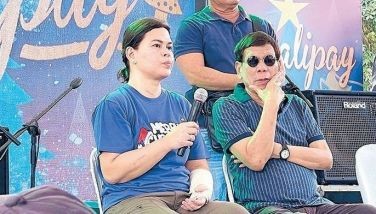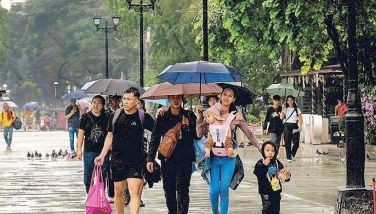Government ready to defend CPR before UN, says envoy
October 19, 2005 | 12:00am
The Philippines is ready to defend before the United Nations last Friday’s police dispersal of a rally in which former Vice President Teofisto Guingona Jr., two lawmakers and a former executive secretary were bombarded with water to prevent them and other rallyists from crossing Chino Roces (formerly Mendiola) Bridge into San Beda Church near Malacañang in Manila.
Ambassador Lauro Baja Jr., Philippine Permanent Representative to the UN, told The STAR yesterday the government is prepared to answer questions on its calibrated preemptive response (CPR) policy on street protests if the matter reaches the UN Commission on Human Rights.
"The Philippine Mission in New York is ready to defend the Philippine position in any forum in the United Nations if ever this issue (CPR) gets to the UN," he said.
Last Monday, Guingona said he would raise the government’s action against rallyists before the UN Committee on Human Rights after police fired water cannons on him and other protesters during a rally last Friday.
Police hosed down the procession, which was also joined by political and Catholic Church leaders like Bishop Julio Labayen, Bishop Deogracias Iñiguez, Bishop Antonio Tobias and Guingona.
Political and church groups denounced the use of excessive and unnecessary force against the rallyists.
They said the government’s repressive policies are obviously designed to extinguish the people’s inalienable right to rally in a nation that has proved capable of overthrowing dictators in the past.
The protesters accused President Arroyo of giving marching orders to police to violently suppress the rallies so that she can hold on to power.
They urged Malacañang to discard the CPR saying it inflicts state-mandated violence on otherwise peaceful religious processions and political rallies.
Anti-government demonstrators and the opposition warned that the CPR would provoke more anti-government street protests and would further exacerbate the political crisis triggered by allegations that Mrs. Arroyo rigged last year’s election.
Last month, the Philippines presided over the United Nations Security Council meetings in New York.
It is the second time in its two-year term as an elected member of the Security Council that it has overseen the work of the most powerful organ of the UN.
The Philippines chairing of the Security Council came at a crucial time when the 191-member UN was discussing reforms in its organization with more than 170 heads of states and governments.
Mrs. Arroyo is the first Philippine president and female head of state to preside over a summit meeting of the Security Council.
She is also the first Asian leader to chair a Security Council summit.
The Philippines took over the seat from Japan after it was elected in October 2003 to a non-permanent seat in the Security Council.
It will vacate its elected seat on Dec. 31.
The Philippines was elected for the fourth time to the Security Council.
A charter member of the UN, the Philippines was an active non-permanent member of the Security Council in 1957-1958, 1963-1964 and 1980-1981.
Ambassador Lauro Baja Jr., Philippine Permanent Representative to the UN, told The STAR yesterday the government is prepared to answer questions on its calibrated preemptive response (CPR) policy on street protests if the matter reaches the UN Commission on Human Rights.
"The Philippine Mission in New York is ready to defend the Philippine position in any forum in the United Nations if ever this issue (CPR) gets to the UN," he said.
Last Monday, Guingona said he would raise the government’s action against rallyists before the UN Committee on Human Rights after police fired water cannons on him and other protesters during a rally last Friday.
Police hosed down the procession, which was also joined by political and Catholic Church leaders like Bishop Julio Labayen, Bishop Deogracias Iñiguez, Bishop Antonio Tobias and Guingona.
Political and church groups denounced the use of excessive and unnecessary force against the rallyists.
They said the government’s repressive policies are obviously designed to extinguish the people’s inalienable right to rally in a nation that has proved capable of overthrowing dictators in the past.
The protesters accused President Arroyo of giving marching orders to police to violently suppress the rallies so that she can hold on to power.
They urged Malacañang to discard the CPR saying it inflicts state-mandated violence on otherwise peaceful religious processions and political rallies.
Anti-government demonstrators and the opposition warned that the CPR would provoke more anti-government street protests and would further exacerbate the political crisis triggered by allegations that Mrs. Arroyo rigged last year’s election.
Last month, the Philippines presided over the United Nations Security Council meetings in New York.
It is the second time in its two-year term as an elected member of the Security Council that it has overseen the work of the most powerful organ of the UN.
The Philippines chairing of the Security Council came at a crucial time when the 191-member UN was discussing reforms in its organization with more than 170 heads of states and governments.
Mrs. Arroyo is the first Philippine president and female head of state to preside over a summit meeting of the Security Council.
She is also the first Asian leader to chair a Security Council summit.
The Philippines took over the seat from Japan after it was elected in October 2003 to a non-permanent seat in the Security Council.
It will vacate its elected seat on Dec. 31.
The Philippines was elected for the fourth time to the Security Council.
A charter member of the UN, the Philippines was an active non-permanent member of the Security Council in 1957-1958, 1963-1964 and 1980-1981.
BrandSpace Articles
<
>
- Latest
- Trending
Trending
Latest
Trending
Latest
Recommended






























